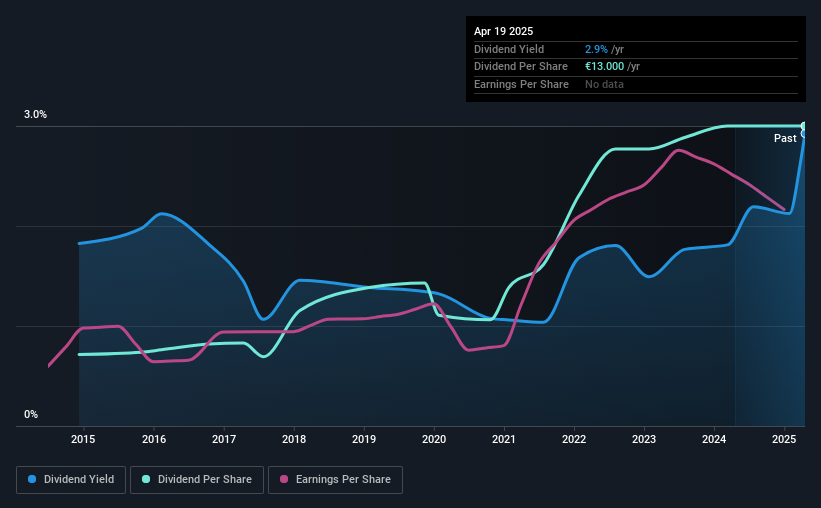Christian Dior SE (EPA:CDI) Looks Like A Good Stock, And It's Going Ex-Dividend Soon
Readers hoping to buy Christian Dior SE (EPA:CDI) for its dividend will need to make their move shortly, as the stock is about to trade ex-dividend. The ex-dividend date is usually set to be two business days before the record date, which is the cut-off date on which you must be present on the company's books as a shareholder in order to receive the dividend. The ex-dividend date is important as the process of settlement involves at least two full business days. So if you miss that date, you would not show up on the company's books on the record date. This means that investors who purchase Christian Dior's shares on or after the 24th of April will not receive the dividend, which will be paid on the 28th of April.
The company's next dividend payment will be €7.50 per share, on the back of last year when the company paid a total of €13.00 to shareholders. Based on the last year's worth of payments, Christian Dior stock has a trailing yield of around 2.9% on the current share price of €444.40. If you buy this business for its dividend, you should have an idea of whether Christian Dior's dividend is reliable and sustainable. We need to see whether the dividend is covered by earnings and if it's growing.
Dividends are usually paid out of company profits, so if a company pays out more than it earned then its dividend is usually at greater risk of being cut. Fortunately Christian Dior's payout ratio is modest, at just 45% of profit. A useful secondary check can be to evaluate whether Christian Dior generated enough free cash flow to afford its dividend. The good news is it paid out just 18% of its free cash flow in the last year.
It's encouraging to see that the dividend is covered by both profit and cash flow. This generally suggests the dividend is sustainable, as long as earnings don't drop precipitously.
Check out our latest analysis for Christian Dior
Click here to see how much of its profit Christian Dior paid out over the last 12 months.

Have Earnings And Dividends Been Growing?
Businesses with strong growth prospects usually make the best dividend payers, because it's easier to grow dividends when earnings per share are improving. Investors love dividends, so if earnings fall and the dividend is reduced, expect a stock to be sold off heavily at the same time. For this reason, we're glad to see Christian Dior's earnings per share have risen 12% per annum over the last five years. Earnings per share are growing rapidly and the company is keeping more than half of its earnings within the business; an attractive combination which could suggest the company is focused on reinvesting to grow earnings further. This will make it easier to fund future growth efforts and we think this is an attractive combination - plus the dividend can always be increased later.
The main way most investors will assess a company's dividend prospects is by checking the historical rate of dividend growth. Christian Dior has delivered 15% dividend growth per year on average over the past 10 years. It's exciting to see that both earnings and dividends per share have grown rapidly over the past few years.
Final Takeaway
Should investors buy Christian Dior for the upcoming dividend? Christian Dior has grown its earnings per share while simultaneously reinvesting in the business. Unfortunately it's cut the dividend at least once in the past 10 years, but the conservative payout ratio makes the current dividend look sustainable. Overall we think this is an attractive combination and worthy of further research.
In light of that, while Christian Dior has an appealing dividend, it's worth knowing the risks involved with this stock. Every company has risks, and we've spotted 1 warning sign for Christian Dior you should know about.
If you're in the market for strong dividend payers, we recommend checking our selection of top dividend stocks.
Have feedback on this article? Concerned about the content? Get in touch with us directly. Alternatively, email editorial-team (at) simplywallst.com.
This article by Simply Wall St is general in nature. We provide commentary based on historical data and analyst forecasts only using an unbiased methodology and our articles are not intended to be financial advice. It does not constitute a recommendation to buy or sell any stock, and does not take account of your objectives, or your financial situation. We aim to bring you long-term focused analysis driven by fundamental data. Note that our analysis may not factor in the latest price-sensitive company announcements or qualitative material. Simply Wall St has no position in any stocks mentioned.
- TILE
- 20.66
- +1.13%
 Index Options
Index Options CME Group
CME Group Nasdaq
Nasdaq Cboe
Cboe TradingView
TradingView Wall Street Journal
Wall Street Journal